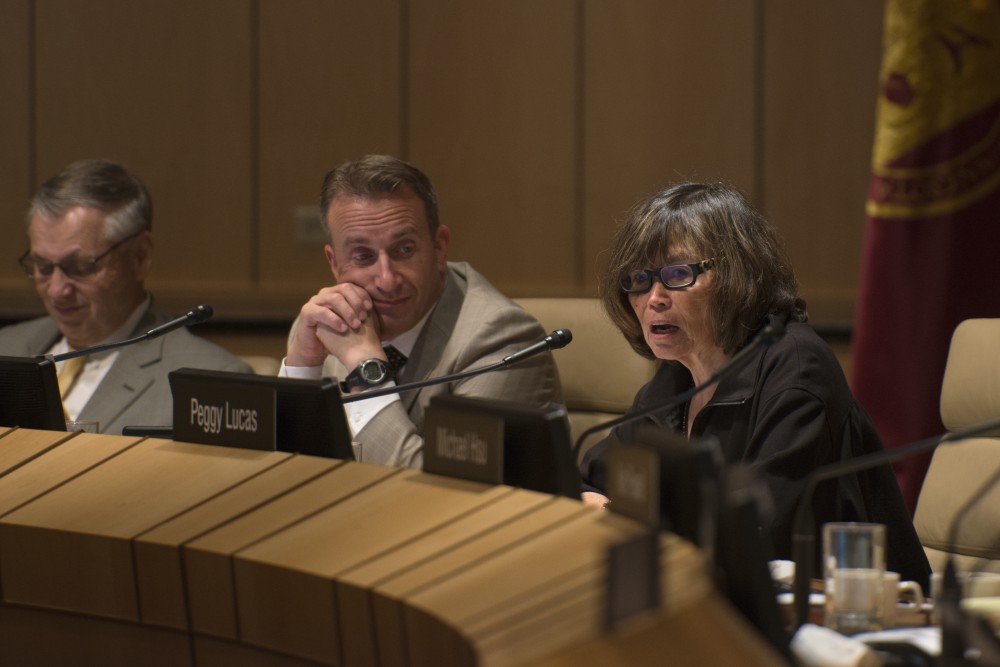At its meeting on Friday,The University of Minnesota’s Board of Regents discussed long-term visions for the St. Paul campus, voted on the Presidential Search Advisory Committee membership and reviewed University President Eric Kaler’s system-wide priorities.
Presidential search advisory committee
The board ratified the membership and charge of the Presidential Search Advisory Committee, which consists of University personnel responsible for guiding the presidential search.
The regents received nearly 400 nominations for committee membership, said Regent David McMillan. The committee is composed of 23 individuals including faculty, students, alumni, staff, regents and community members.
In response to criticism from faculty and staff, students and community members on what they said is a lack of representation on the committee, McMillan announced that Mike Sheffert, a University graduate and founder and CEO of Manchester Companies, would join the committee.
Regents Peggy Lucas, Steve Sviggum and Abdul Omari will serve on the committee, with Omari serving as committee leader.
Earlier this week, seven student governance leaders from the Twin Cities and system campuses, along with seven of the eight student representatives to the board, wrote a letter of concern to the regents criticizing the lack of student and system representation on the committee. The two students serving on the committee are Catalina Anampa Castro, chair of the University Student Senate Consultative Committee, and Harrison Frisk, vice president of the University’s Council of Graduate Students.
“As we assembled the committee, we considered how to best represent students from across the system, so we appointed the chair of the University-wide Senate … although that student is from the Twin Cities campus, her role is to represent the entire system at the senate and on this committee,” said McMillan. “We need to act more like a system, and this seat was intentionally filled by a student with system responsibility.”
In response to student and staff concerns, McMillan said the regents will seek input from those communities through listening sessions held on the Twin Cities and system campuses.
“We look forward to hearing a breadth of student perspective and voices across these opportunities,” he said.
St. Paul campus strategic facilities plan
The regents heard and discussed updates to the St. Paul Strategic Facilities Plan on Thursday, which will create a cohesive vision and direction for the St. Paul campus.
Possible changes to the St. Paul campus being considered include a way to improve the quality and perception of the campus, said Mike Berthelsen, vice president of University Services.
One of the plan’s priorities is protecting research land and open space that exists on the campus, as these places are central to the St. Paul campus identity, Berthelsen said.
Brian Burh, dean of the College of Food, Agriculture and Natural Resource Sciences, said University leaders want the campus to serve as an outreach destination, like the Minnesota Landscape Arboretum in Chaska.
To implement this, ideas discussed at the meeting included converting Buford Avenue into a more centralized main street, creating a new student commons area attached to the Magrath Library and demolishing and renovating certain buildings to improve research facilities on the campus.
Regents Darrin Rosha, Michael Hsu, Dean Johnson and Omari expressed concern over creating a long-term, strategic facilities plan before establishing an academic strategic plan, which would arrange enrollment projections and the long-term goals of colleges.
However, Kaler said most components of the campus’s academic future, like the location of CFANS and the Veterinary Medical Center, are unlikely to change.
Berthelsen stressed that ideas discussed at the meeting are far from complete and will not be finalized until December.
“It’s a broad, very long-term set of directions to guide our planning and ideas going forward,” he said.
Systemwide strategic priorities
In his final year as University president, Kaler will move forward with key elements of the school’s systemwide strategic plan.
The plan’s priorities include pursuing opportunities to increase systemwide enrollment, addressing Minnesota’s research needs like opioid addiction and aging, and optimizing marketing, communications and resource use across the system, Kaler said.
Also in his last year, Kaler will complete the M Health agreement, finalize the St. Paul Strategic Facilities plan and the Academic Health Center reorganization, move forward with plans to change historic building names and address the University’s child care needs.
Hsu and Omari criticized Kaler for making slow progress on historical renamings.
“I was also disappointed in the naming memo, that committee has been running for some time,” Hsu said. “I’m not going to take a position on whether or not we should rename something, but I think we need to get closer to that sooner or later because this is just going to drag on if we pass it from committee to committee.”
While Kaler will focus on moving forward with some aspects of the system-wide strategic plan, the broader plan will be left for his successor to complete, said Regent Ken Powell.
The next board meeting is scheduled for October.








